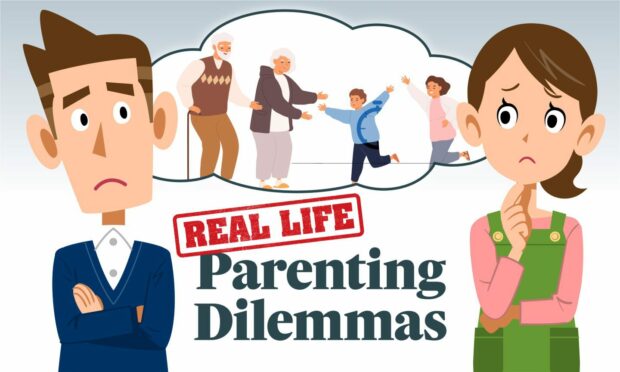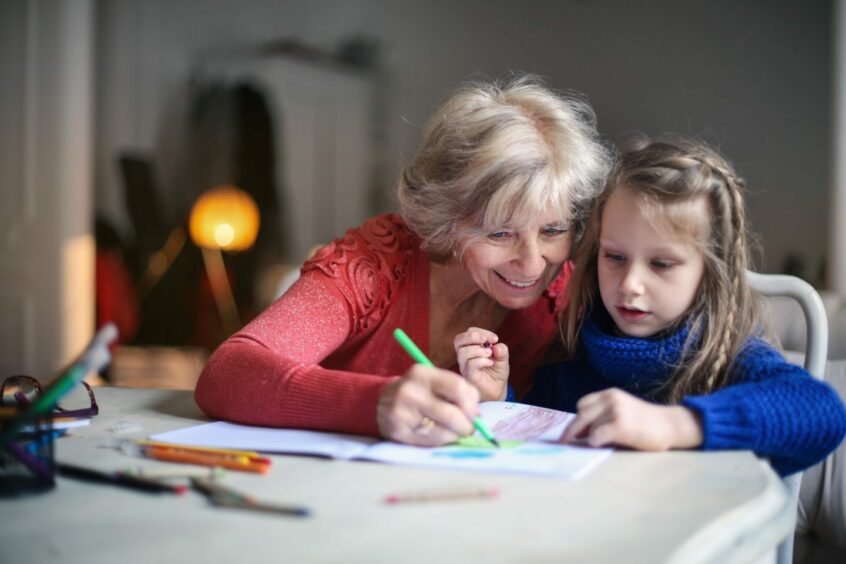Relying on Granny and Grandad for childcare is becoming an increasing feature of family life in the north and north-east.
If you feel guilty at using your own parents as ‘free childcare’, you can console yourself with the fact that you’re not alone.
Over 40% of UK grandparents – that’s five million – provide regular childcare for their grandchildren, according to Age UK. And one in 10 look after their grandkids at some point on every day of the week.
The argument from parents is that, in today’s climate with rising costs and expensive childcare options, they have little choice but to rely on grandparental help.
It has been estimated that grandparents save British families £22 billion a year in childcare costs – that’s £28,000 a year, depending on where you live.
Granny took semi-retirement to help out with grandkids
Mandy and Michael Fletcher live in Kintore, Aberdeenshire with sons Harrison, three, and Cameron, one.
Both work full-time to make ends meet. Harrison goes to nursery part-time – the rest of the time they get grandparental help to make things work.
“Nursery’s just too expensive,” said Mandy.
“It’s £60 a day and going up all the time. Michael’s mum, who is still working, actually went down to part-time after we had Harrison so she could help out.”
Michael added: “I don’t really think about what it would be like without my parents’ help, because it’s a bit of a scary thought.”
This chimes with my own experiences as a parent.
Luckily my first two children began life in Sweden, which not only has the world’s most generous parental leave, but also heavily subsidised childcare.
As an example, while living in Sweden I had both kids in nursery 35 hours a week. Total cost? About £130 a month.
You can imagine Mr and Mrs Fletcher’s reaction to this.
Heavily reliant on Granny and Grandad
But now back in the north-east, and with child number three having just turned two, my wife and I are heavily reliant on Granny and Grandad.
Like Michael, I try not to think of life here without grandparental help – something I never enjoyed in Sweden but, with the way the system is set up there, didn’t particularly need.
Need to stay late at work? No problem, pick up the phone. One child falls ill? Same deal.
Parents across the north and north-east who are lucky enough to benefit from such help will recognise the luxury of having this sort of back-up on tap.
Ruth Woods is a children’s specialist at Robert Gordon University (RGU) in Aberdeen.
She believes the increasing role of grandparents in children’s lives is simply bringing Scotland in line with the rest of the world.
“This reliance on grandparents for childcare is probably actually the norm across most societies through history,” said Ruth.
“In many traditional societies, grandparents and other family members, including older children, would look after young children while the parents worked.
“From an anthropological, historical perspective, this role for grandparents is not at all unusual.
“Contemporary Western societies’ reliance on formal childcare is more the exception than the rule.”
Grandparents’ involvement beneficial, but parents shouldn’t be forced to rely on it
Shaddai Tembo is a lecturer in early childhood studies at Open University Scotland. He previously worked at the University of the Highlands and Islands (UHI).
He said that while grandparental help was of benefit to children, grandparents and parents alike, resorting to Granny and Grandad to make family life work is ultimately a ‘limited strategy’.
Although Aberdeenshire, Moray and Highland councils have all made efforts to improve childcare provision, Shaddai called on the powers that be to make things easier for parents so they don’t feel forced to rely on their own parents.
“Having a grandparent present to support with childcare can be really beneficial for the child. Both in terms of forging intergenerational ties and providing the child with different role models to learn from.
“These informal arrangements can also help to alleviate the financial costs associated with young children under two accessing childcare.”
‘Parents need a more accessible and affordable system of childcare’
He added: “However, clearly not everyone has access to an extended family support network, producing an inequality between those who can draw on grandparents and those who cannot.
“Relying on parents’ parents as an informal solution, therefore, seems ultimately limited as a strategy.
“It might be more useful to place a greater onus on the government to offer a more accessible and affordable system for children from birth, not two-years-old, in Scotland.
“The case for early investment has long been clear, yet this remains an overdue discussion that, if not addressed, will only further inequality between families.”
In August last year, the Scottish Government increased childcare entitlement to 1,140 hours a year (30 hours a week if taken during term time).
Things have improved in recent years. But the message seems to be that parents still need more help to make things work.
And they shouldn’t feel too guilty about dropping the kids off at Granny and Grandad’s.
What is your Real Life Parenting Dilemma? Send your question (we’d especially love a video of you asking it) to schoolsandfamily@pressandjournal.co.uk and we’ll try to find the answer.



Conversation